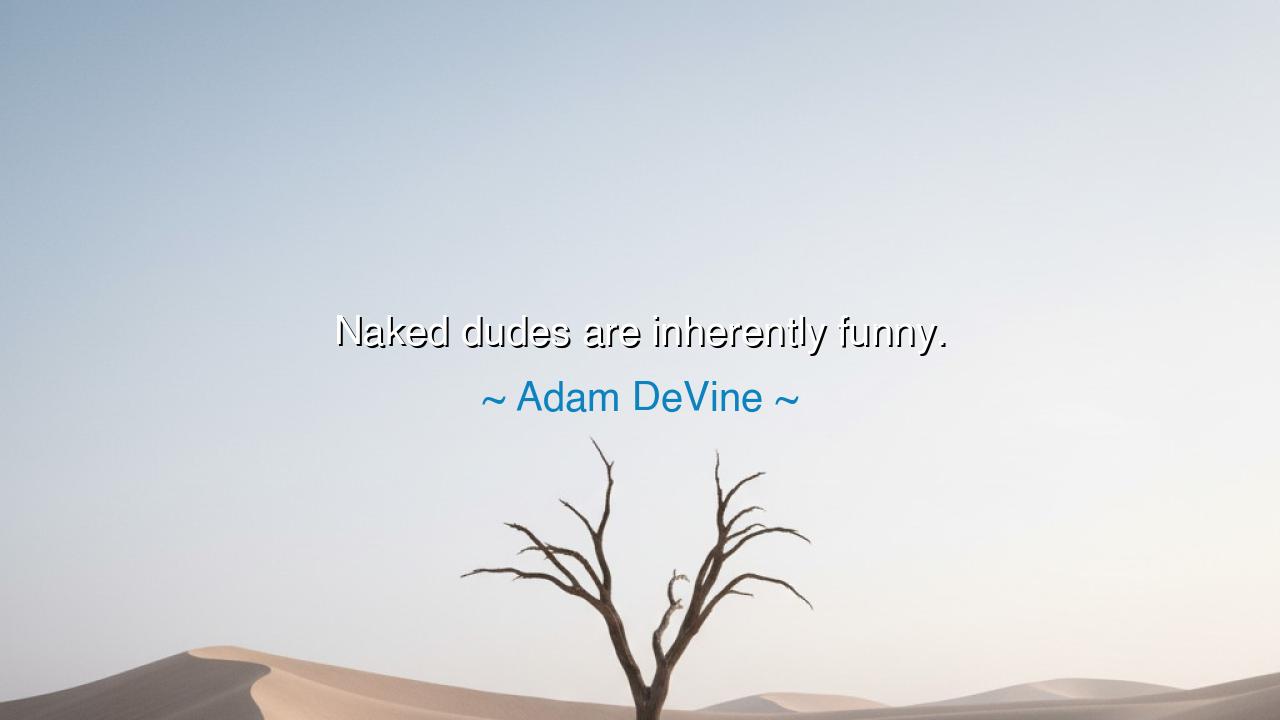
Naked dudes are inherently funny.






The jester-philosopher Adam DeVine, known for his fearless humor and self-mockery, once declared: “Naked dudes are inherently funny.” Though this statement may sound lighthearted, even absurd, it contains a hidden wisdom about vulnerability, humility, and the eternal comedy of being human. Beneath the laughter, DeVine’s words remind us of a truth as old as civilization itself — that to be stripped of pretense, to stand bare and unguarded, is both terrifying and deeply, irresistibly human. What makes us laugh in such moments is not mockery, but recognition: for in another’s vulnerability, we see the reflection of our own.
To call nakedness “inherently funny” is to acknowledge the absurdity of the human condition. We spend our lives constructing masks — clothing not only for our bodies, but for our minds and souls. We dress ourselves in titles, possessions, and reputations, believing they make us dignified. Yet when all is stripped away, we are revealed in our simplicity — fragile, imperfect, and equal. This sudden exposure of truth, so rare in daily life, shatters the illusion of superiority and control. It is this shattering that provokes laughter — not cruel laughter, but the laughter of relief, the laughter that says, Ah, yes, we are all ridiculous together.
The ancients, too, understood the humor and holiness of nakedness. In the festivals of Dionysus, the god of wine and ecstasy, the Greeks celebrated by casting off clothing and inhibition, dancing freely in the streets. Their laughter was not shameful but sacred, for it reminded them that beneath all roles — king and beggar, scholar and fool — every human is simply a creature of flesh and spirit. To mock nakedness, they believed, was to mock life itself. But to laugh at it joyfully was to accept the truth that freedom and folly are intertwined. In this way, DeVine’s quip carries a lineage that stretches back to the temples of laughter and the fires of ancient celebration.
Consider, too, the story of Diogenes the Cynic, who lived in a barrel and mocked the pretensions of Athens. He was known to wander unclothed through the city, calling himself “a dog of reason.” When asked why he lived this way, he said, “I am stripping away what is false to find what is real.” His nakedness was both a joke and a revelation — a living reminder that the trappings of civilization often conceal the truth of our nature. In this, we find the essence of DeVine’s humor: that the naked man, in his foolishness and honesty, becomes a mirror to us all. He exposes not only his body, but the fragile illusions of pride and perfection we each cling to.
There is also a gentleness in this kind of laughter. To find humor in vulnerability is to embrace compassion. When we laugh at a “naked dude,” we are not laughing at pain, but at the absurdity of our shared human awkwardness. It is a laughter that disarms rather than wounds. It reminds us that to be human is to stumble, to blush, to be clumsy and unguarded — and that there is beauty in this imperfection. The wise understand that true comedy does not mock from above; it laughs from within. It laughs with love.
In this way, DeVine’s statement transcends mere jest. It becomes a lesson in humility — a call to let go of the armor we wear in life. When he says “Naked dudes are inherently funny,” he is not simply describing the surface, but revealing a truth of the soul: that honesty, in all its rawness, has its own strange power. When we can laugh at ourselves — at our bodies, our fears, our mistakes — we reclaim control over the things that once shamed us. The man who can laugh at his nakedness fears no judgment, for he has already accepted himself as he is.
The lesson, then, is this: do not fear being seen for who you truly are. The world’s laughter need not be cruel — it can be freeing. If you stumble, laugh; if you falter, rise with a smile. The ancients taught that to live well is to live honestly, and humor is the gentlest path toward that truth. Let your imperfections become your punchline, and you will find strength in your humanity. For the man who dares to stand bare before the world — whether in body, in spirit, or in truth — has nothing left to hide, and therefore, nothing left to lose.
So, my child, when you hear Adam DeVine’s jest, do not take it lightly. See within it the wisdom of laughter — that even the ridiculous holds meaning, and that even a joke can unveil truth. To laugh at nakedness is to laugh at life itself — not in mockery, but in awe. For to be human is to be exposed before the universe, trembling and magnificent, clothed only in imperfection — and that, in the end, is what makes us both funny and beautiful.






AAdministratorAdministrator
Welcome, honored guests. Please leave a comment, we will respond soon